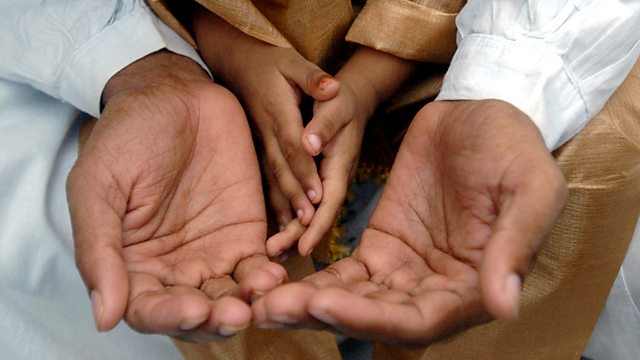Forgiveness
Is forgiveness possible in the aftermath of violent crime or conflict and can you have it without remorse? With the Reverend Mpho Tutu, Michael McGirr and Marina Cantacuzino.
Samira Ahmed explores the complexity of forgiveness. What effect does it have in the aftermath of violent crime, conflict or injustice? Is it possible without remorse and is there any crime that is beyond forgiveness? With the Rev鈥檇 Mpho Tutu, co-author with her father Archbishop Desmond Tutu of a book about forgiving; author and teacher Michael McGirr, and Marina Cantacuzino, former journalist and founder of The Forgiveness Project.
(Image: Hands stretched out with palms upright. Credit: AFP/ Getty Images)
Last on
More episodes
Previous
Next
Chapters
-
Mpho Tutu
Why victims and their families should have the 'right to forgive'
Duration: 14:19
Michael McGirr
Forgiveness is an ugly thing that requires brutal honesty
Duration: 08:41
Sixty Second Idea: Michael McGirr
An implant that would enable a word limit of 4.6 million words per person in a lifetime
Duration: 03:46
Marina Cantacuzino
How forgiving is making peace with something or someone you cannot change
Duration: 12:44
Mpho Tutu
![Mpho Tutu]()
The Rev鈥檇 Mpho Tutu is an Episcopal Priest, executive director of The Desmond & Leah Tutu Legacy Foundation and Chairperson Emeritus of the board of the Global AIDS Alliance. She has run ministries for rape survivors in South Africa; for refugees from South Africa and Namibia at the Phelps Stokes Fund in New York City, and for children all over the world.聽聽 She is co-author with her father, Archbishop Desmond Tutu of The Book of Forgiving (published by William Collins).聽 Here she writes about her own call to forgiveness when she discovered the battered body of her housekeeper on the floor of her daughter鈥檚 room.聽 The event continues to reverberate for her and her family.聽 Mpho says that forgiveness is not weakness.聽 There is nothing that cannot be forgiven and there is no one undeserving of forgiveness. 聽Photo credit: AFP/ Getty Images
Michael McGirr
![Michael McGirr]()
Michael McGirr聽 Australian writer, teacher and former Roman Catholic priest.聽 He is author of Things You Get For Free, a memoir of a journey he takes around Europe with his Mother on the honeymoon she and her late husband never got round to having聽聽(published in the UK by Scribe Books). 聽Of forgiveness he says: it is like聽 putting down a burden.聽 It鈥檚 the point at which you鈥檝e been saddled with something hard to carry and you finally put down the load.
Marina Cantacuzino
![Marina Cantacuzino]()
Marina Cantacuzino is founder and director of The Forgiveness Project.聽 Having worked as a journalist for many years she knew she was far more moved by stories of forgiveness than revenge. In 2003, in response to the imminent invasion of Iraq, Marina embarked on a personal project collecting stories in words and pictures of people who had lived through violence, tragedy or injustice and had sought forgiveness rather than revenge. These became part of the Forgiveness Project.聽 In addition Marina works alongside offenders in prisons in England and Wales on restorative justice and victim awareness programmes.聽 Marina explains how forgiveness is about making peace with something or someone you cannot change, and she discusses how the project is currently involved in tackling prisoner re-offending rates.
60 Second Idea to Improve the World
![60 Second Idea to Improve the World]()
Michael McGirr wants every human to have a life-time word limit.聽 He argues that we are all drowning in words and that we can鈥檛 hear anything of importance because the words are lost in all the chatter.聽 The average person is said to use 365 million words in a lifetime.聽 Michael鈥檚 new limit would be 4.6 million words which is approximately the number of words that the nineteenth century British social commentator and novelist Charles Dickens wrote in his lifetime.聽 Michael recommends a word-counter implant in every-human being.聽聽
Broadcasts
- Sat 21 Jun 2014 21:06GMT91热爆 World Service Online
- Sun 22 Jun 2014 09:06GMT91热爆 World Service Online
- Mon 23 Jun 2014 02:06GMT91热爆 World Service Online
What is the role of libraries in the digital age?
Podcast
-
![]()
The Forum
The programme that explains the present by exploring the past







